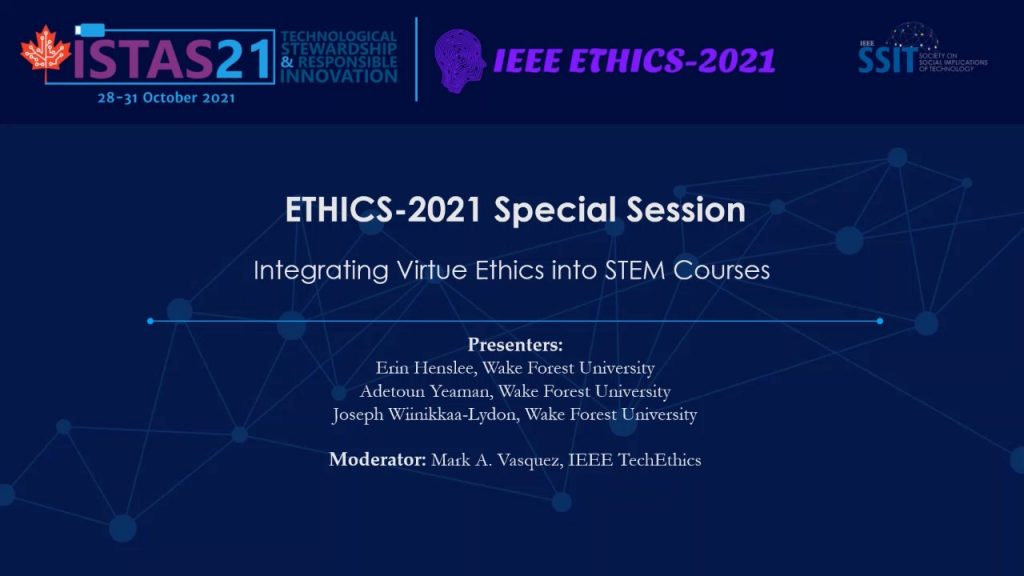
The “Integrating Virtue Ethics into STEM Courses” session took place during ETHICS 2021 on 31 October 2021. It was moderated by Mark A. Vasquez, Senior Program Manager, IEEE TechEthics.
Click here to view the video recording.
The objectives of this session are (1) Introduce participants to a virtue ethics framework; (2) Describe modular integration of the framework in a robotics course through 9 weekly “Ethical Considerations in AI” assignments; (3) Assist participants in the development or planning of a virtue ethics module in the context of their own course.
Character is “the collection of stable, deep, and enduring dispositions that define who we are and shape how we characteristically think, feel, and act”. Virtue ethics is the theoretical foundation of character education. Virtues of character are thus stable and enduring dispositions that enable us to think, feel, and act in morally good ways for morally good ends. Importantly, though character virtues represent enduring dispositions, like other personality traits, they can be intentionally taught and developed by well-designed pedagogies. The complexities and needs of the future STEM workforce requires knowledge, skills, and abilities (KSAs) that extend beyond STEM disciplinary silos. This includes fostering an internationally collaborative approach to research and development that is entrepreneurial, socially responsible, and engages the workforce in life-long learning. An approach our department has taken to develop engineering students to meet these demands is to integrate character education into the curriculum. Current work by our department-wide character project uses an established taxonomy within professional education, the Jubilee Centre Framework. This framework identifies four types of virtues: intellectual, moral, civic, and performance. A recent review on engineering ethics education found that current practices lead to shortcomings in emerging professionals (not just engineers) such as the rigid interpretation of ethics and in considering the broader societal impacts of their decision-making. We have implemented a modular approach to engineering ethics, infusing character education comprehensively into our curricula. Thus, discussions of ethics are not isolated to a single course, but may develop over 4 years. While ethics education may focus on student decision making during specific times of ethical dilemmas, character education focuses on the habitual actions, motivations, and virtues that prepare students for those difficult decisions while also influencing their daily behaviors. This, we believe, offers a more aspirational framework for ethics education, allowing the student to reflect on- and develop their own character while engaging in ethical discussions and decision- making. Further, this seeks to bring utility to ethics education beyond decision-making in the face of ethical dilemma, but in the formation of STEM professionals and their role in society.
Presenters
Dr. Erin Henslee, Assistant Professor, Department of Engineering, Wake Forest University
Dr. Adetoun Yeaman, Engineering Education Postdoctoral Fellow, Department of Engineering, Wake Forest University
Dr. Joseph Wiinikka-Lydon, Department of Engineering, Wake Forest University






 JOIN SSIT
JOIN SSIT